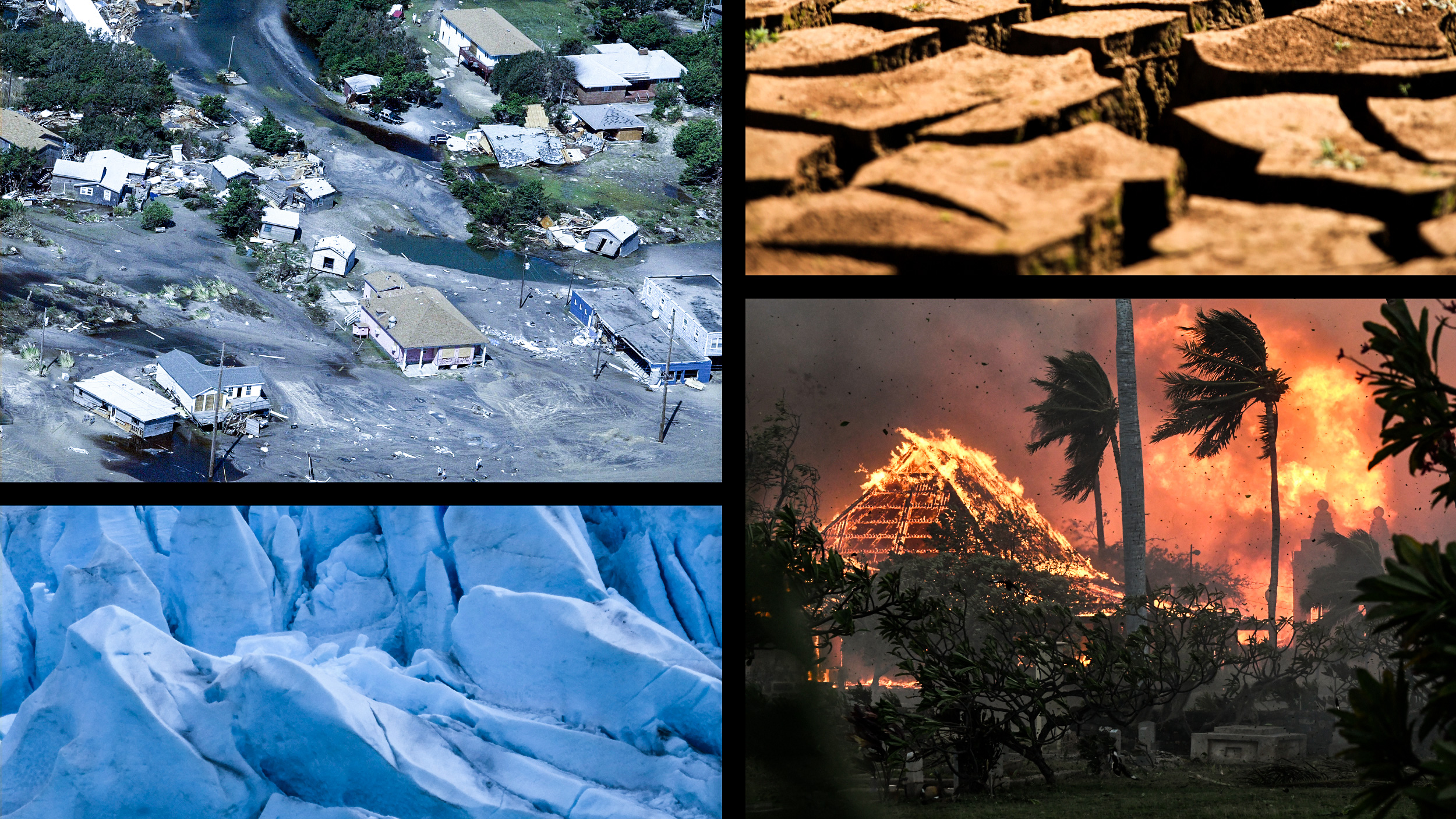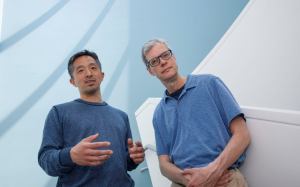
AP photos
14 projects confronting climate change win Salata Institute grants
Researchers across disciplines team up to tackle problems ranging from inefficient buildings to fragile healthcare systems
The Salata Institute Seed Grant Program, launched in April to enable new interdisciplinary research in climate and sustainability, has announced its first cohort of awards. The program will support 19 faculty members working across seven Harvard Schools with funding for projects ranging from exploring a new, algae-based building insulation material to researching the carbon footprint of AI-driven computing.
Harvard faculty members interested in applying to the program, which is supported by a gift from the Troper Wojcicki Foundation, can access the current call for proposals to learn more. The next deadline to apply is Sept. 8.
Here’s a look at the first 14 projects the program is funding, presented in alphabetical order by lead researcher’s name.

Using sensors buried in arctic ice to better predict sea-level rise
Principal investigator Carlos Argüelles-Delgado
Co-principal investigator David R. Clarke
Just how much — and how fast — sea levels will rise is one of the most pressing questions raised by climate change. Understanding the dynamics of glacial melting is crucial to producing accurate sea level forecasts, which in turn help decision-makers and stakeholders mitigate and adapt to shifting risks. The team will use readings collected over 10 years from sensors buried in a cubic kilometer of Antarctic ice to better understand how glacial melting will fuel sea level rise.

Insulating buildings with algae foam
Principal investigator, Martin Bechthold
Co-principal investigator Jennifer Lewis
Most homes in the U.S. are still heated and cooled with fossil fuels, contributing significantly to climate change. Thermal insulation remains the most impactful and cost-effective way to reduce buildings’ energy consumption and emissions — but insulation materials remain too carbon-intensive. Faculty from the Graduate School of Design and John A. Paulson School of Engineering and Applied Sciences will work to develop a proof of concept for a carbon-negative insulation material made from microalgae.

Communicating benefits of climate action
Principal investigator Joe Blatt
Co-principal investigators Mina Cikara, Dustin Tingley, and K. “Vish” Viswanath
An effective response to climate change in the U.S. will require broad support. The key to overcoming resistance to green energy and sustainability solutions may lie in communicating their benefits — from new, high-paying jobs to better public health and fewer catastrophic weather events. Faculty from the Graduate School of Education, the Departments of Government and Psychology in the Faculty of Arts and Sciences, and the T.H. Chan School of Public Health will design and test content.

Studying electricity subsidies, consumption in developing world
Principal investigator Rema Hanna
Co-principal investigators Ben Olken, Elan Satriawan, and Sudarno Sumarto
Indonesia has made great strides in providing electricity access to its citizens, jumping from about 53 percent coverage in 2000 to nearly 100 percent today. Yet Indonesia’s grid is carbon-intensive. A team from the Kennedy School, MIT Economics, and the National Team for the Acceleration of Poverty Reduction in Indonesia will examine the relationship between electricity subsidies and consumption in Indonesia. The results may help policymakers tailor subsidy programs to reduce climate impacts in low- and middle-income countries.

Quantifying the carbon footprint of future technologies
Principal investigator Gage Hills
Co-principal investigators David Brooks and Gu-Yeon Wei
Recent estimates suggest that the information and communication technology sector drives 2.1 to 3.9 percent of global carbon emissions. That number is expected to increase as demand for computing driven by artificial intelligence, metaverse, blockchain, and Internet of Things devices accelerates. At the same time, advanced silicon technologies and beyond-silicon nanotechnologies are being explored for improving energy efficiency of computing systems. Faculty from SEAS will develop a framework to study how these future technologies impact climate change and energy efficiency.

Blending wildfire observations with numerical modeling
Principal investigator Frank Keutsch
Co-principal investigator Loretta J. Mickley
In the coming decades, wildfires in the western U.S. are projected to increase dramatically. Gaps in understanding about the links between climate change and wildfire activity present challenges for policymakers. Harvard faculty will launch a pilot study examining two critical but poorly understood dimensions of wildfire risk: the potential of plumes from the most intense blazes to penetrate into the stratosphere and the consequences to our atmosphere and regional climate. The team hopes to demonstrate a practical path to combining state-of-the-art observing systems with numerical modeling.

Recognizing Indigenous claims for environmental justice
Principal investigator Michèle Lamont
Lamont is an expert on the power of recognition — rendering others as visible and valued — in driving social and cultural change. She will expand her work to examine recognition in a global context with a special focus on claims for environmental justice by Indigenous people. Through in-depth interviews, Lamont and her team will explore the environmental and climate justice-related views of Indigenous people living in Canada and the Northern Mariana Islands of the South Pacific.

Building climate-resilient health systems
Principal investigator Megan Murray
As climate change deepens health risks worldwide, there is a need for climate-resilient health systems. This need is especially urgent in low- and middle-income countries, where rising temperatures, changing precipitation patterns, and rising sea levels increasingly compromise air quality, water availability, and access to nutritious foods. Faculty from the Department of Global Health and Social Medicine at Harvard Medical School will launch a workshop, bringing together experts from across disciplines to chart a shared research agenda focused on the role of community health workers.

Enhancing campus sustainability
Principal investigator Vijay Janapa Reddi
A project at Harvard’s Science & Engineering Complex, led by an applied-machine-learning-systems expert, will deploy tiny machine-learning sensors throughout the SEC to explore resource consumption and waste generation. It will enable real-time monitoring and analysis, fostering discussions and learning among STEM students on climate change and sustainability. The collected data will empower students to make informed choices, inspiring eco-friendly practices and potential solutions.

Rethinking window glass requirements
Principal investigator Holly Samuelson
With window glass selection in mixed climates, architects can prioritize saving heating or cooling energy. The optimal glass properties depend on not only building type and window orientation — variables already lumped together in today’s broad-brush building codes — but also properties of evolving heating systems and electricity generation. Since windows built today will be in place for decades, Samuelson, an associate professor at the Graduate School of Design, will study the potential benefits of revising glass requirements.

Who’s suffering? Studying toll on mental health.
Principal investigator Karen Thornber
In June 2022, the World Health Organization released a policy brief underscoring the lack of research on the toll of climate change on mental health, impacts that are distributed unequally. Thornber will analyze how the impacts of climate change on mental health intersect with class, race, ethnicity, gender, and other factors. Thornber will draw on case studies — from Inuit, Sámi, Indigenous Taiwanese, and Polynesian stories to bestsellers and blockbusters from Asia, Africa, the Americas, and Europe.

Decarbonizing healthcare systems
Principal investigator Stéphane Verguet
Healthcare is not only at risk from climate change, it is also a major polluter, representing 4 to 5 percent of global carbon emissions. The World Health Organization is urging countries to reduce pollution while reinforcing health systems. Since November 2021, 65 countries have committed to developing low-carbon health systems. This team will provide evidence for governments to use in equitably and efficiently decarbonizing their healthcare systems.

Calculating computing’s footprint
Principal investigator Gu-Yeon Wei
Co-principal investigator David Brooks
A commonly ignored consequence of the computer age is the carbon footprint of making and running computers. As an explosion in services relying on vast amounts of computing continues, the carbon impacts will continue to mount. SEAS researchers will launch an effort to develop a practical and accurate measure of carbon emissions associated with the fabrication and operation of computers and electronic devices.

Toward a national agroforest
Principal investigator Amy Whitesides
As carbon sinks, forests play a key role in mitigating climate change. Historically and today they are lost to urban and agricultural expansion. Agroforestry may offer means to diversify and protect lands that face encroachment and climate threats and often support lower-income communities. Whitesides of the Graduate School of Design will explore the formation of a National Agro-forest. This work will bring together landscape architects, planners, foresters, farmers, municipalities, and specialists in land management.




